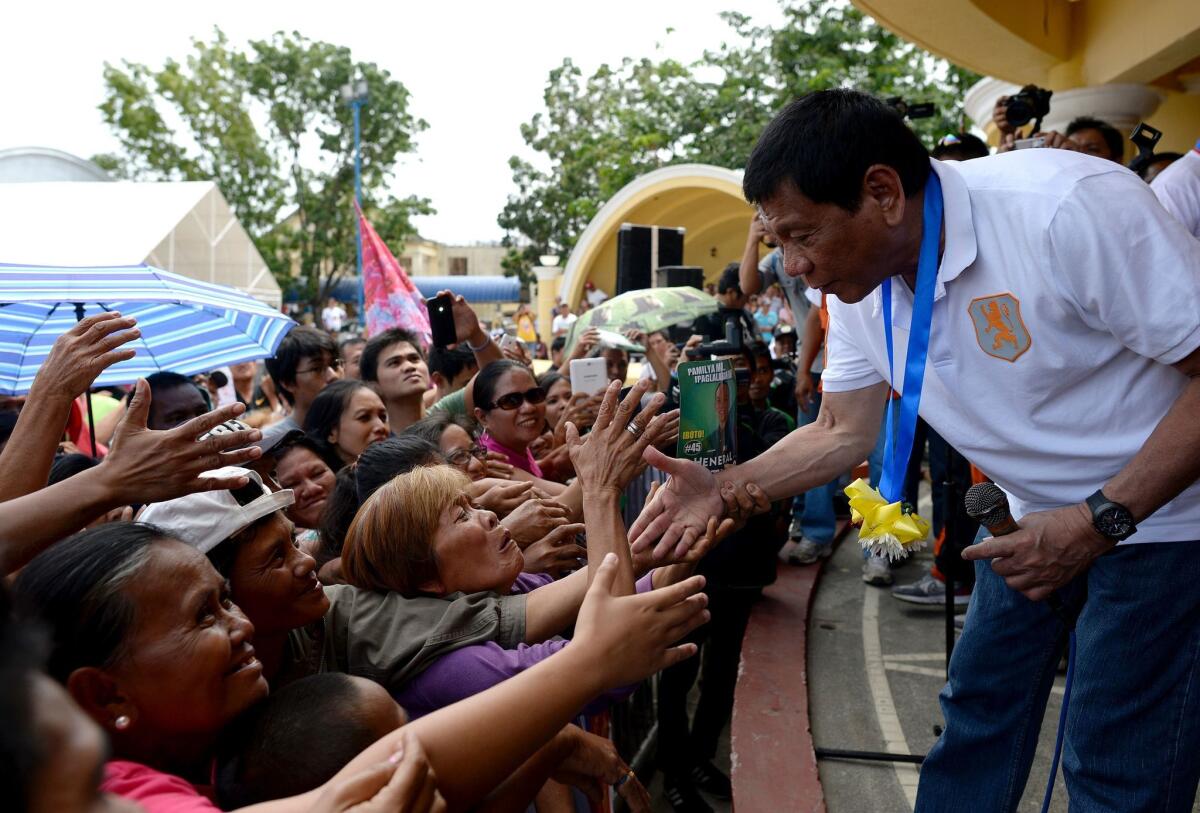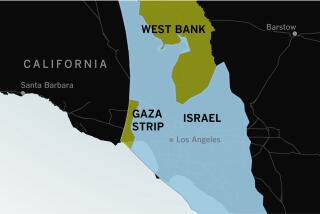Philippines presidential candidate draws comparisons to Trump

Davao City Mayor and presidential candidate Rodrigo Duterte shakes hands with supporters in Lingayen, Philippines, on March 2.
- Share via
Reporting from Beijing — Like your presidential politics spicy, but need a break from the Trump-Cruz-Kasich-Sanders-Clinton circus?
Then cast your gaze to the Philippines, where the 2016 campaign has become a nail-biter between a tough-on-crime, foul-mouthed, motorcycle-riding mayor accused of links to death squads, and a U.S.-educated senator and adopted daughter of movie stars whose candidacy was nearly derailed by questions over whether she’s a bonafide Philippine citizen.
Voters in the Southeast Asian nation of 100 million, a longtime U.S. ally, will go to the polls in three weeks to choose a replacement for President Benigno Aquino III, who was elected in 2010 and is limited to one six-year term.
Aquino has proved a relatively popular president, and under his leadership the Philippines has had one of the best-performing economies in Asia, with GDP growing 5.8% in 2015 — behind only China and Vietnam.
But during his tenure, tensions have been rising between Manila and Beijing over China’s territorial claims in the South China Sea, and Aquino has steered the Philippines toward even warmer relations with the United States. In the early 1990s, Philippine leaders ousted U.S. troops from the country, but in 2014 the two countries signed a pact that lets the Pentagon rotate troops into the Philippines for prolonged stays and allows Washington to build and operate facilities on Philippine bases.
Aquino’s designated Liberal Party successor, Manuel “Mar” Roxas II, has vowed a seamless continuation of Aquino’s policies. (His campaign slogan? “Continue the Straight Path.”) But Roxas — who has a degree from the University of Pennsylvania and is the son of a senator and grandson of a president — has struggled to gain traction with voters in the five-way race. A survey conducted last week by the public opinion firm Social Weather Stations (SWS) showed him in third place with just 17% support.
In a statistical tie for the lead were Sen. Grace Poe, a former teacher who lived in Virginia for years, and Rodrigo Duterte, the 71-year-old mayor of Davao City whose say-anything style and anti-establishment rhetoric has drawn comparisons to Donald Trump.
“It’s the two outsider candidates who are doing well,” said Mark Thompson, director of the Southeast Asia Research Centre at the City University of Hong Kong.
See more of our top stories on Facebook >>
Poe had 34%, while Duterte had 33%. Another survey conducted from March 30-April 2 by the firm Pulse Asia showed Duterte in the lead with 30% and Poe pulling 25% support. Candidates do not have to secure an absolute majority of votes; whoever garners the most ballots wins.
Having served seven terms as mayor, Duterte is campaigning on his record of crime fighting in Davao City, a metropolis of about 1.5 million on the southern island of Mindanao. Once known as the nation’s murder capital, Davao is now touted by tourism groups as one of Asia’s safest cities.
But critics say Duterte, who is known as “The Punisher,” has accomplished this by ordering police to shoot to kill and sanctioning shadowy so-called death squads who target petty criminals, drug dealers and even street children. Human Rights Watch says more than 1,000 people have apparently been killed by organized vigilantes in Davao since the late 1990s.
Duterte has challenged rights groups to file a case against him in court, vowing to prove his innocence. But at the same time, he’s seemingly embraced their allegations and doubled down on them. Campaigning under the slogan “Fearlessness and Compassion,” he’s boldly pledged to “solve drugs, criminality and corruption” in three to six months.
“If I become president, hide. That number [of killed] 1,000 will reach 50,000,” he boasted before declaring his candidacy. “I would kill all of you who make the lives of Filipinos miserable.” He added that he would throw victims’ bodies in Manila Bay and “make the fish there fat.”
NEWSLETTER: Get the day’s top headlines from Times Editor Davan Maharaj >>
Phelim Kline, deputy director of Human Rights Watch’s Asia Division, lamented what he called the “shameful history of political tolerance” for Duterte’s tactics at the highest levels of government.
“Duterte’s boastful brand of violent impunity should be a path to prosecution, not a platform for political office,” he said in a commentary.
On Monday, a video of Duterte joking about raping an Australian missionary who was slain in a Davao prison riot in 1989 sparked a fresh round of controversy over the candidate.
“I saw her face and I thought, ‘Son of a bitch. What a pity’ ... they raped her…. I was mad she was raped but she was so beautiful. I thought, the mayor should have been first,” Duterte told a crowd of laughing supporters at a campaign rally. The comments have been denounced by women’s groups and others.
“He’s very polarizing,” said Thompson. While the posting of the video, he believes, was an effort by someone powerful to discredit Duterte, “the problem is that this outrageous statement jibes with other statements he’s made” that have won him only more support.
Duterte’s call for adopting a federalist system and give more power and money to regional governments has also proved popular in regions where voters believe too much control is concentrated in the capital, Manila.
Poe, for her part, has pledged to improve education, infrastructure and government transparency, help the poor, and crack down on corruption. She’s vowed to steer the country into the U.S.-led trade pact known as the Trans-Pacific Partnership.
But Poe, 47, almost didn’t make it to the starting line. Though she won election as a senator in 2013 with 20 million votes — the most of any candidate in Philippine history — her eligibility for the presidency was challenged in a case that was ultimately decided by the Supreme Court.
Opponents questioned whether Poe met the citizenship and minimum 10-year residency requirements for the nation’s highest office. Poe was abandoned as an infant on the doorstep of a church and raised by movie star Fernando Poe Jr. and his actress wife, Susan Roces, but her birth parents remain unknown.
She graduated from Boston College with a degree in political science, married a Filipino American and later became a U.S. citizen. Her father’s (ultimately unsuccessful) bid for the presidency in 2004 sparked her interest in politics and prompted her to move home and renounce her American passport.
While Aquino’s tenure has been one of the most stable and prosperous in years, Thompson said many Filipinos are “cynical” about his legacy. “The poor feel they’re not benefiting and unemployment remains high,” so there’s some appetite for change,” he said.
How big a change, though, and how disruptive, remains to be seen.
“This election could create a new round of instability,” said Thompson. “If there’s a battle over the winner, if someone wins by 1 or 2 percentage points, there could be a long slow count or a court challenge.”
“It could be messy,” he said.
ALSO
China’s media watchdog bans children from appearing on reality TV
Jerusalem bus explosion that wounded at least 21 was a terror attack, police say
The Taliban’s spring offensive is on, but Afghan forces make gains near strategic city
More to Read
Sign up for Essential California
The most important California stories and recommendations in your inbox every morning.
You may occasionally receive promotional content from the Los Angeles Times.














